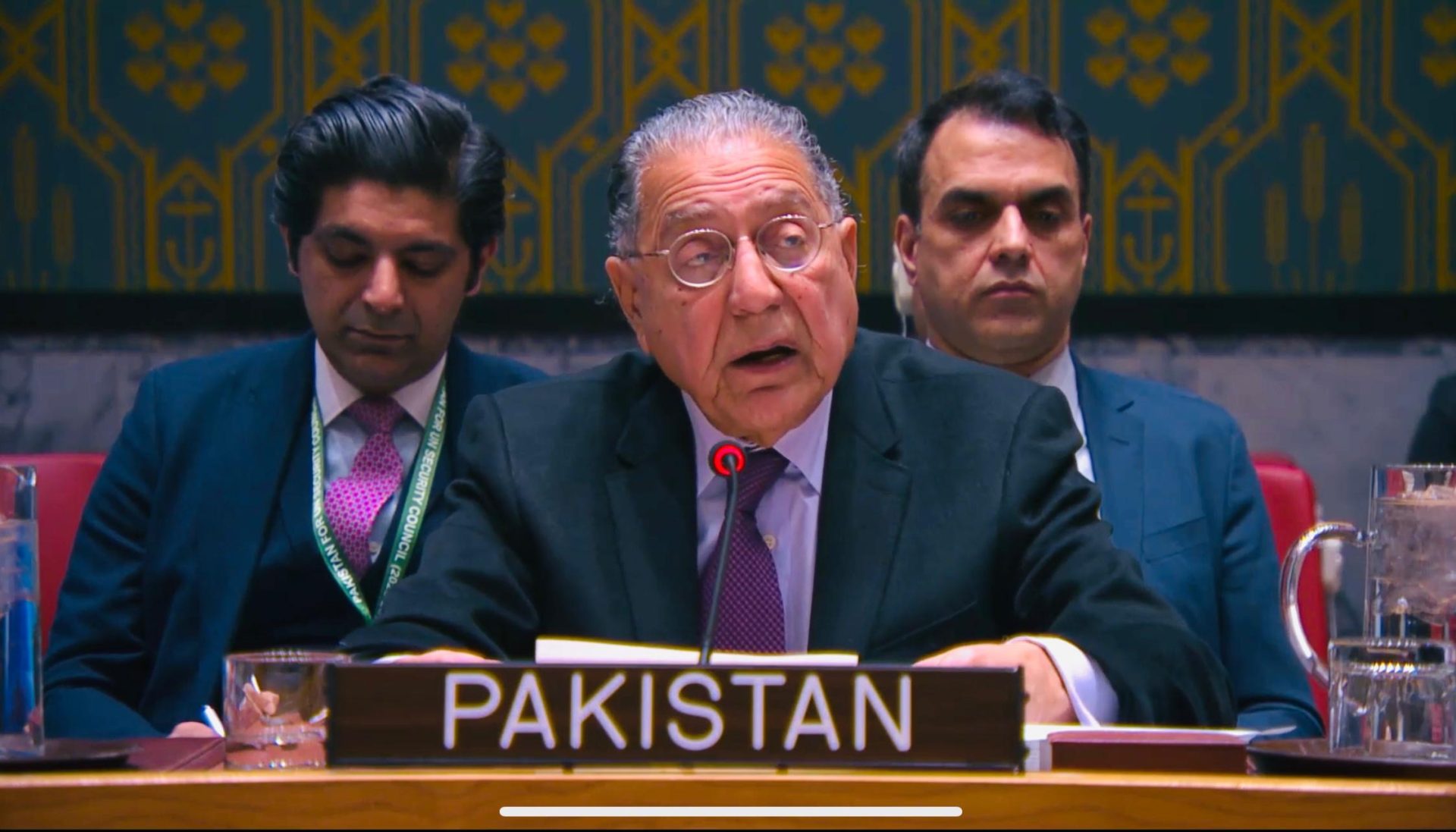 United Nations, February 10, 2025(Kamran Raja): While strongly rejecting any imputation that an ISIL-K/Daesh recruitment is taking place inside the country, Pakistan has urged the international community to take greater cognizance of the renewed terrorist threat posed by the TTP, Majeed Brigade and Daesh. It stated in unequivocal terms that over two dozen terrorist groups are operating inside Afghanistan, which is also the “main hub for ISIL-K’s recruitment and facilitation,” as is confirmed by the UN Monitoring Team’s recent report.
United Nations, February 10, 2025(Kamran Raja): While strongly rejecting any imputation that an ISIL-K/Daesh recruitment is taking place inside the country, Pakistan has urged the international community to take greater cognizance of the renewed terrorist threat posed by the TTP, Majeed Brigade and Daesh. It stated in unequivocal terms that over two dozen terrorist groups are operating inside Afghanistan, which is also the “main hub for ISIL-K’s recruitment and facilitation,” as is confirmed by the UN Monitoring Team’s recent report.
In a statement today at the UN Security Council briefing on “Threats to international peace & security caused by terrorist acts, Ambassador Munir Akram, Pakistan’s Permanent Representative to the UN, reminded the 15-member UN Security Council that this threat of Daesh, TTP and Majeed Brigade is a threat not only to Afghanistan and Pakistan but also to the entire region and beyond.
“Those responsible for the situation must take these assessments into account and the scale of the threat posed by these terrorist groups and their affiliates which are well documented in the reports of the Secretary General and the Monitoring Team must be responded to.
While drawing the attention of the international community to the terrorist threats from Afghanistan, Ambassador Akram stated that after successfully decimating Al-Qaeda and other terrorist groups within our borders, Pakistan continues to confront terrorist threats such as the TTP, Daesh and the Majeed Brigade operating from safe havens across our borders.
He said that “we are concerned that while mention is made of Daesh, the threat that is posed to Pakistan by the TTP and by the Majeed Brigade has not been mentioned by our colleagues around the table.”
Ambassador Akram highlighted the urgent need to address the root causes of terrorism such as poverty, injustice and prolonged unresolved conflicts, foreign occupation and denial of the right to self-determination to peoples under colonial and foreign domination and alien rule, such as in the occupied territories of Palestine and Jammu and Kashmir.
“Without addressing the root causes, we can hope for little success if our focus remains restricted to the consequences of such policies,” he maintained.
The Pakistan UN Ambassador said that it is unfortunate that counter-terrorism policies have often equated Islam with terrorism and extremism, adding that such misplaced notions fuel Islamophobia and further radicalization.
He also pointed out the collective failure to address state terrorism including the use of state power to suppress legitimate struggles for self-determination or to continue foreign occupation, adding that state sponsorship of terrorism in other countries also remains unaddressed.
Ambassador Akram cautioned against the possibility of counter-terrorism efforts being misused to violate human rights and international humanitarian law. He called for accountability of fundamental human rights violations including that of the right to self-determination.
He drew the attention of the international community to mutation of terrorism into various forms and stated that terrorism will not be comprehensively addressed unless the new and emerging forms of terrorism including violent acts by white supremacists, far right extremists, violent nationalist, fascist, xenophobic, Islamophobic and anti-Muslim groups, and similar ideologies are dealt with in various parts of the world.
Ambassador Munir Akram said that there was a need to recognize the danger posed by the use of new technologies, including ICTs by terrorists to organise online and collaborate with transnational criminal networks to recruit and finance their activities. He said that the new cyber tools of terrorism, including the dark web and crypto currencies are being utilised increasingly for radicalisation campaigns, incitement to violence, terror financing, propaganda and disinformation through the social media.
He called for bringing about necessary changes in the UN’s counter terrorism architecture and sanctions regimes in order to effectively respond to the current challenges and make the mechanism fair, just and comprehensive.
“The gaps in the UN’s Counter-Terrorism efforts need to be addressed and it is for this reason that Pakistan believes the UN General Assembly should establish a subsidiary body to promote the universal consideration and balanced implementation of all four pillars of the GCTS with the vital support of UNOCT as its executing arm,” he held.
He expressed Pakistan’s strong condemnation of terrorism in all its forms and manifestations and said, “For more than four decades, we have remained at the forefront of global counter terrorism efforts and been a principle target of terrorist attacks, financed by our adversaries in the region and we have paid a heavy price in innocent human life; lost 80,000 casualties and enormous damage to our economy.